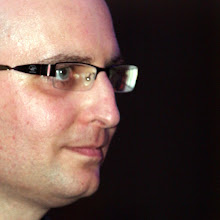יום שבת, 20 ביולי 2013
מַה הִפְעִים עַד בְּלוֹת
מַה הִפְעִים עַד בְּלוֹת
מַחֲשֶׁבֶת תַּדְהֵמוֹת?
אֵי דְּרָכַי בָּאוֹת,
כִּי שָׁוְא חִפַּשְׂתִּי אוֹת?
עֵת וֶאֱמֶת מוֹרוֹת,
חִנָּם עָמַלְתִּי זֹאת.
הַיּוֹם נִשְׁקַף בָּהִיר,
רָחוֹק אוֹתִי מוֹתִיר,
יָגוֹן עוֹד צָץ תָּדִיר,
צָהֳלָתִי יַקְדִּיר,
כָּל הַשָּׁנָה אַכִּיר,
רַק חֹרֶף וְסַגְרִיר.
קֹר, עֲצֹר,
שֶׁמֶשׁ תַּקְרִין חֹם,
אָז אַל תִּירָא פִּתְאוֹם.
בָּרוּךְ הַפָּז,
חֵן שָׁם נִתַּז
חֲלוֹם אוֹהֵב בָּאוֹר נֶעֱלָז.
מאת ג'ון דאולנד (1563-1626), מתוך ספר השירים השלישי (1603)
(תרגום שלי מאנגלית)
המקור:
O what hath overwrough
Read more...
מַחֲשֶׁבֶת תַּדְהֵמוֹת?
אֵי דְּרָכַי בָּאוֹת,
כִּי שָׁוְא חִפַּשְׂתִּי אוֹת?
עֵת וֶאֱמֶת מוֹרוֹת,
חִנָּם עָמַלְתִּי זֹאת.
הַיּוֹם נִשְׁקַף בָּהִיר,
רָחוֹק אוֹתִי מוֹתִיר,
יָגוֹן עוֹד צָץ תָּדִיר,
צָהֳלָתִי יַקְדִּיר,
כָּל הַשָּׁנָה אַכִּיר,
רַק חֹרֶף וְסַגְרִיר.
קֹר, עֲצֹר,
שֶׁמֶשׁ תַּקְרִין חֹם,
אָז אַל תִּירָא פִּתְאוֹם.
בָּרוּךְ הַפָּז,
חֵן שָׁם נִתַּז
חֲלוֹם אוֹהֵב בָּאוֹר נֶעֱלָז.
מאת ג'ון דאולנד (1563-1626), מתוך ספר השירים השלישי (1603)
(תרגום שלי מאנגלית)
המקור:
O what hath overwrough
O what hath overwrough
My all amazed thought?
Or whereto am I brought,
That thus in vain have
sought
Till Time and Truth hath
taught,
I labour all for nought?
The day I see is clear,
But I am ne’er the near,
For grief doth still
appear,
To cross our merry cheer,
While I can nothing hear,
But winter all the year.
Cold, hold,
The sun will shine warm,
Therefore now fear no
harm.
O blessed beams,
Where beauty streams
Happy happy light to
love’s dreams.
By John Dowland (1563-1626)









